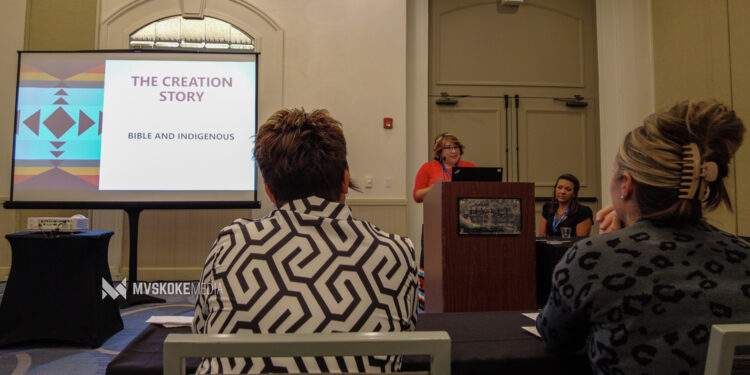Byline: Kaylea Berry/Reporter
TVLSE, Oklahoma – The Oklahoma Nurses Association (ONA) held its annual convention Sept. 28th and 29th. The theme this year was Power of Nursing; Educate, Innovate, Celebrate. The Oklahoma Indigenous Nurses Association (OINA) conducted a breakout session on Thursday titled “The Journey of the First Native American Nurse”.
The overall objective of the presentation was not to be offensive, point fingers or pass blame but for reconciliation, to bring awareness and problem solve. Sonya Frazier (Choctaw/Chickasaw), OINA President, and Taloa Sharp (Choctaw/Chickasaw), OINA Staff, spoke about the first recognized Indigenous Nurse Susie Walking Bear Yellowtail, Indigenous movements, culture and what needs to change in the healthcare field.
Yellowtail, born in 1903, was the first Native American and the first Apsáalooke (Crow) to graduate as a Registered Nurse in the United States. She attended boarding school in Oklahoma and Montana and graduated from Boston City Hospital School of Nursing in 1923. She was an advocate for Indigenous people, and served at the tribal, state, federal levels on Native health and education councils and accomplished much more.
Indigenous movements are groups of people working together to bring awareness, change and healing. Movements that were discussed included Every Child Matters, Land Back and MMIW/MMIP.
Every Child Matters is about remembering the survivors and missing children that attended boarding schools across Canada and the United States. Land Back seeks to restore or establish Indigenous sovereignty. MMIW/MMIP, Missing and Murdered Indigenous Women/People, stems from Every Child Matters and advocates to end violence against Native women and all Indigenous people.
“We’re not silent anymore and we don’t have to be,” Sharp said. “It’s kind of a good feeling.”
Before colonization, Indigenous people had their holistic views consisting of the body, spirit, mind, and emotions. The belief is that there needs to be a balance between each aspect for a person to be healthy. Each tribe has their own language, customs, ceremonies, and a lot of tribes are matrilineal. Other aspects of Indigenous culture are traditional medicine, coping skills through storytelling, elders and children are considered sacred, and the Americas are called “Turtle Island” in the creation story. Assimilation tried to take all this away so they could “kill the Indian, save the man”.
There were 367 Native Boarding Schools, 83 of which resided in Oklahoma because of the high Indigenous population, and of those 83 schools 9 are still open. Children were removed from their families and taken far away to an unfamiliar place to be stripped of their language, culture, family, and identity. They faced sexual, physical, and mental abuse. Children died away from their families and many were never reunited. The disconnect and abuse trickles down from generation to generation, even to this day.
Dr. Maria Yellow Horse Brave Heart, Ph.D. (Hunkpapa/Oglala Lakota) defines historical and generational trauma as “the accumulative emotional and psychological wounding over one’s lifetime and from generation to generation following loss of lives, land and vital aspects of culture.”
The consequences from boarding schools continue to affect Indigenous people, families, and communities today. Diabetes, alcoholism, neglect, broken relationships, distrust, and many other issues are more prominent today than before assimilation.
Frazier and Sharp both have multiple relatives that attended boarding schools and shared how those experiences have affected them and even their children. Frazier said that growing up her father would bark at her and her siblings, but they did not understand why. He told them that he did it so that they would not be scared or caught off guard by anyone or anything.
Some of the ways change can come about in healthcare include culture liaisons, knowing different cultural beliefs, knowing how history continues to affect people, getting to know the patients and “just being a decent human being”.
Questions and comments that Sharp and Frazier have encountered in the healthcare field include “Why do I need to know what tribe someone is?”, “It happened so long ago though”, “Why is it important?”, and “You get free healthcare”.
“No, it’s not free,” Frazier said. “It cost us those babies; it cost their lives, their culture, their identity.”
We can always learn from others and their cultures as well as share our own. This is how we move from cultural appropriation to cultural appreciation. Nurses and everyone should be educating themselves continuously.
“We’re moving towards healing and to do that we have to do it collectively,” said Sharp.
Indigenous and non-Indigenous cultures can coexist with healing and understanding.
During the presentation there were many attendees with tears in their eyes and a lot of them came up to Frazier and Sharp after to express their interest and appreciation.
For additional information, Mvskoke Media has an article about OINA on the website. The OINA program is open to all nurses and nursing students in Oklahoma. To become a member of ONA and OINA visit the ONA website.





